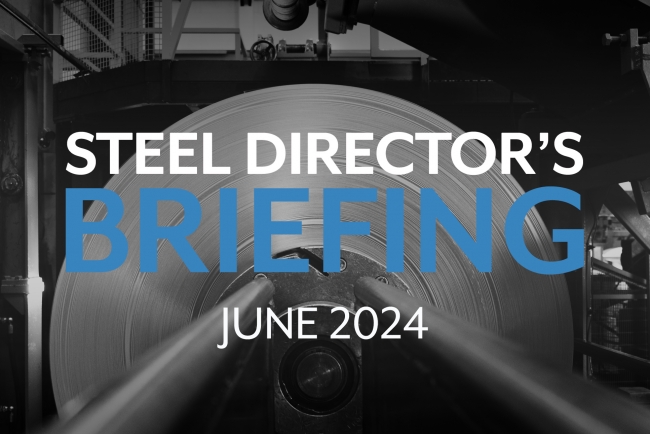Steel Director's Briefing - June 2024

In the ever-evolving landscape of the UK steel industry, our focus remains very much on the current market conditions and the impending changes, particularly those concerning Tata Steel's transition to Electric Arc Furnaces (EAFs). As the industry watches these developments closely, the broader implications for supply chains and production continuity are under close scrutiny.
Coil buyers have rejected steelmakers' efforts to increase prices in May, reflecting subdued demand across key sectors. The uncertainty around Tata Steel's ongoing labour negotiations and what strike action could look like adds another layer of uncertainty. There remains a lack of clarity on how Tata will manage its transition to EAFs, although they have announced their intention to meet customer needs through imported materials during the transition, and there are indications that they are importing substrate materials from outside the UK to aid production continuity. This situation underscores the importance for manufacturers to review their supply chain strategies, ensuring they are robust enough to handle potential disruptions and seize emerging opportunities.
The automotive sector continues to show signs of stagnation. The demand for automotive-grade steel hasn't rebounded to expected levels, influenced in part by broader economic factors and specific industry challenges such as increasing competition from Chinese EV imports. Similarly, the construction sector is grappling with the dual pressures of high interest rates and the anticipation of their reduction. This financial climate is stifling demand, with companies hesitant to commence new projects or expand existing ones until there is more economic certainty.
From a global perspective, there are still no signs of improved demand from China, maintaining a consistent trend from previous months. This stagnation is contributing to the global surplus of steel, affecting markets worldwide. In Europe, despite the dampened demand, there have yet to be significant capacity reductions at major mills. However, as summer approaches, it seems plausible to expect some adjustments. Notably, as reported last month, ThyssenKrupp has already made moves to scale back production, and there is speculation that ArcelorMittal may soon follow, especially with their new initiatives to enhance sustainability in their operations.
Meanwhile, Asian pricing offers from mills have been lower than those from European producers. Indian galvanised steel, which emerged as an attractive option due to its competitive pricing and relatively short lead times, resulted in a swift filling of this quarter's import quota. With similar issues likely in quarters to come.
At Cooper and Jackson, we continue to experience robust demand and have successfully attracted new clients by offering comprehensive assessments of their supply chains. Our proactive approach to managing supply chain risks is resonating more strongly than ever with companies looking to navigate the uncertainties surrounding Tata's supply issues.
We are also excited to share that Bob Pedley, a distinguished figure in the industry, is retiring and transferring the operations of Pedley Steels to Cooper and Jackson. Coil trading activities were transferred on May 1st, with other activities following suit on June 1st. This transition reflects our shared values and our commitment to ensuring our customers have access to the most adaptable and dependable supply chains. Bob will continue to guide day-to-day trading activities during this period to guarantee a smooth integration.
As the steel industry faces ongoing changes and challenges, the sector stands at a critical juncture. With an election on the horizon in the UK, there is a widespread call for a clear and robust manufacturing strategy from the incoming government. This may be optimistic, but such a strategy could catalyse a new era of growth and innovation, enabling the industry to not only adapt but thrive.
